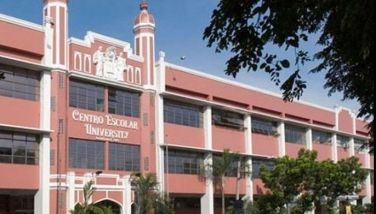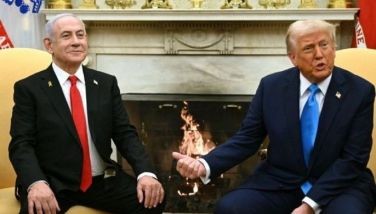Russia hikes gas price for Ukraine
MOSCOW — Russia on yesterday sharply hiked the price for natural gas to Ukraine and threatened to reclaim billions previous discounts, raising the heat on its cash-strapped government, while Ukrainian police moved to disarm members of a radical nationalist group after a shooting spree in the capital.
NATO foreign ministers were gathering for a two-day meeting in Brussels to consider further steps in the wake of Russia's annexation of Crimea, including measures to reassure the Baltic states, Poland, and Romania that the alliance would help guarantee their security.
Alexei Miller, the head of Russia's state-controlled natural gas giant Gazprom, said yesterday that the company has withdrawn December's discount that put the price of gas at $268.50 per 1,000 cubic meters and set the price at $385.50 per 1,000 cubic meters for the second quarter.
The discount was part of a financial lifeline which Russian President Vladimir Putin offered to Ukraine's President, Viktor Yanukovych, after his decision to ditch a pact with the European Union in favor of closer ties with Moscow. The move fueled three months of protests which led Yanukovych to flee to Russia in February.
Radical nationalist groups played a key role in Yanukovych's ouster, but they quickly fell out with the new government. Many activists are still encamped on Kiev's Independence Square, known as the Maidan, and have signaled their intent to remain there until the election of what they deem to be a legitimate government.
Last week, one of the leaders of the most prominent radical group, the Right Sector, was shot dead while resisting police.
Right Sector members then besieged parliament for several hours, breaking windows and demanding the resignation of Interior Minister Arsen Avakov. They lifted the blockade after lawmakers set up a panel to investigate the killing.
Late Monday, a Right Sector member shot and wounded three people outside a restaurant adjacent to Kiev's main Independence Square, including a deputy city mayor, triggering a standoff that lasted overnight.
Police responded by surrounding the downtown Dnipro Hotel, which Right Sector had commandeered as its headquarters, demanding that the radicals lay down their weapons and leave. Avakov said that Right Sector members agreed yesterday to leave their weapons behind and went to a suburban camp, escorted by officers of Ukraine's Security Service.
The Ukrainian parliament then voted to order police to disarm all illegal armed units. Backers of the measure said the drive was needed to combat a recent surge in violent crime and to defuse the risk of provocations by "foreign citizens" in Kiev and the south and east of Ukraine, heavily Russian-speaking regions where anti-government groups have rallied over the past several weekends in calls for secession.
In March, authorities launched a broad appeal for the voluntary surrender of weapons, many of which went astray from police depots during months of unrest. The government has said a similar amnesty will remain in effect in April.
If police disarm nationalists and other radical groups, it would undermine Russia's key argument: the allegation that the new Ukrainian government was kowtowing to nationalist radicals, who threaten Russian-speakers in southeastern Ukraine. Russia has pointed at the perceived threat from ultranationalists to defend its annexation of Crimea, and has concentrated tens of thousands of troops along its border with Ukraine, drawing Western fears of an invasion.
Putin and other officials have said that Russia has no intention of invading Ukraine. Defense Minister Sergei Shoigu insisted yesterday that the Kremlin wants a "political settlement that would take interests and rights of the entire Ukrainian people into account."
NATO Secretary General Anders Fogh Rasmussen said he couldn't confirm reports of a Russian pullback from Ukraine's borders.
"This is not what we have seen," he told reporters in Brussels. "And this massive military buildup can in no way contribute to a de-escalation of the situation, a de-escalation that we all want to see, so I continue to urge Russia to pull back its troops, live up to its international obligation and engage in a constructive dialogue with Ukraine."
German Chancellor Angela Merkel told a news conference in Berlin that she could not confirm any withdrawal. Even if Putin had removed some troops, she said, "it is also certainly not the final step... the troop concentration on the Ukrainian border is very high."
Germany's foreign minister, Frank-Walter Steinmeier, renewed a push for internationally backed direct talks between Russia and Ukraine amid "small signals of de-escalation" including the launch of an international observer mission.
"What will be important in the coming days is getting Russia and Ukraine around a table together," Steinmeier said at a meeting with his French and Polish counterparts in Weimar, Germany. He said that could be done in an international framework — "it can be a contact group, it can be a support group."
Russia has used financial levers to hit Ukraine, which is teetering on the verge of bankruptcy. Gazprom's Miller said that the decision to charge a higher price in the second quarter was made because Ukraine has failed to pay off its debt for past supplies, which now stands at $1.7 billion.
On yesterday the Russian parliament moved to annul agreements with Ukraine on Russia's navy base in Crimea. In 2010, Ukraine extended the lease of Russia's Black Sea Fleet's base until 2042 for an annual rent of $98 million and discounts for Russian natural gas. The lower house voted to repeal the deal Monday, and the upper house was to follow suit.
Russian Prime Minister Dmitry Medvedev has said that Russia had given Ukraine $11 billion in gas discounts in advance and should claim the money back once the lease deal is repealed — a threat repeated yesterday by Deputy Foreign Minister Grigory Karasin.
The Russian moves would fall hard on Ukrainian consumers, who have benefited from generous state subsidies that have kept gas prices low while swelling government debt.
Ukraine has agreed to gradually withdraw subsidies under a deal with the IMF that required the country to make its utility costs economically viable for the state by 2018 as condition for up to $18 billion in loans. Household gas prices in Ukraine are set to rise 50 percent beginning May 1.
- Latest
- Trending































